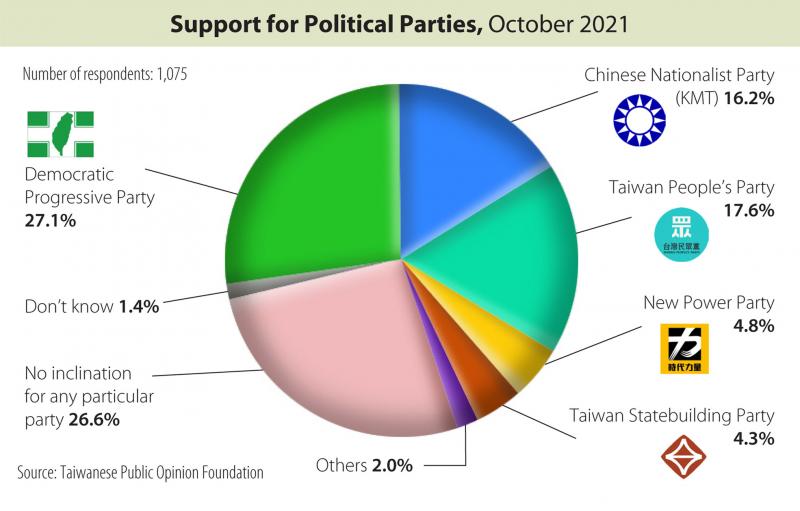Support for the Taiwan People’s Party (TPP) has for the first time overtaken the Chinese Nationalist Party (KMT), making it the nation’s second-largest political force, the Taiwanese Public Opinion Foundation said yesterday, as it released the results of its latest public opinion survey.
The foundation’s survey on political support and the referendums in December found that 17.6 percent support the TPP, compared with 16.2 percent for the KMT, a lead of 1.4 percentage points and the highest ever recorded for the party.
The Democratic Progressive Party (DPP) held firm at the top at 27.1 percent, although a close 26.6 percent of respondents declined to choose any party.

Meanwhile, 4.8 percent chose the New Power Party (NPP), 4.3 percent supported the Taiwan Statebuilding Party and 2 percent chose other parties, while the remaining 1.4 percent either did not know or declined to answer.
The most striking result is the TPP “overtaking the KMT at the bend” to become the country’s second-largest party for the first time, foundation chairman Michael You (游盈隆) said.
Also worth noting is the record support for the Taiwan Statebuilding Party on the eve of the recall vote of its sole legislator, Chen Po-wei (陳柏惟), You said.
The results also mark a “dramatic shift” from last month’s poll, with the DPP and KMT recording sharp declines and minor parties seeing boosts, he said.
More specifically, the DPP and the KMT lost 3 and 3.1 percentage points respectively, while the TPP gained 4.3 percentage points, the NPP added 1.8 percentage points and support for the Taiwan Statebuilding Party increased by 1.9 percentage points.
The number of moderates also dropped by 3.1 percentage points, although whether the results are indicative of a changing political landscape has yet to be seen, You said.
When the TPP was founded, it only enjoyed 8.1 percent support, but it has more than doubled that, he said.
Whether it can maintain its newfound popularity is a question that should not be taken lightly, especially as its chairman, Taipei Mayor Ko Wen-je (柯文哲), eyes the presidency in 2024, he added.
Meanwhile, the KMT has found itself stuck in a prolonged slump ever since last year’s presidential and legislative elections, You said.
Its current support is the third-lowest it has been over the past two years, and a 3 percentage point slump from last month in a blow for new KMT Chairman Eric Chu (朱立倫), he added.
The survey, designed by You and executed by Focus Survey Research, was conducted from Monday to Wednesday last week.
Pollsters selected participants aged 20 or older via nationwide sampling of residential telephone numbers, collecting 1,075 valid samples with a margin of error of 2.99 percentage points.
Asked about the survey, TPP spokesperson Yang Bao-zheng (楊寶楨) said that public opinion is fickle and the party cannot be complacent after seeing figures representing only a moment.
She also called on the DPP to respond to public opinion, as “the people will turn on you if you turn your back on them.”
Brushing polls off as “reference material,” the KMT called attention to the discrepancy between the foundation’s figures and those gathered by the Election Study Center at National Chengchi University and other organizations.
It added that the poll was held before the successful Chen recall vote on Saturday, saying the political situation has changed significantly.
Additional reporting by Chen Yun and Shih Hsiao-kuang

A strong continental cold air mass is to bring pollutants to Taiwan from tomorrow, the Ministry of Environment said today, as it issued an “orange” air quality alert for most of the country. All of Taiwan except for Hualien and Taitung counties is to be under an “orange” air quality alert tomorrow, indicating air quality that is unhealthy for sensitive groups. In China, areas from Shandong to Shanghai have been enveloped in haze since Saturday, the ministry said in a news release. Yesterday, hourly concentrations of PM2.5 in these areas ranged from 65 to 160 micrograms per cubic meter (mg/m³), and pollutants were

Taiwan’s armed forces have established response protocols for a wide range of sudden contingencies, including the “Wan Chun Plan” to protect the head of state, the Ministry of Defense (MND) said today. After US President Donald Trump on Saturday launched a series of airstrikes in Venezuela and kidnapped Venezuelan President Nicolas Maduro, concerns have been raised as to whether China would launch a similar “decapitation strike” on Taiwan. The armed forces regularly coordinate with relevant agencies and practice drills to ensure preparedness for a wide range of scenarios, Vice Minister of National Defense Hsu Szu-chien (徐斯儉) told reporters before a

EVA Airways on Saturday said that it had suspended a pilot and opened an investigation after he allegedly lost his temper and punched the first officer several times as their plane was taxiing before takeoff at Los Angeles International Airport. According to a report published on Thursday by The Reporter, the incident occurred after the flight’s Malaysian first officer tried to warn the Taiwanese pilot, surnamed Wen (文), that he was taxiing faster than the speed limit of 30 knots (55.6kph). After alerting the pilot several times without response, the first officer manually applied the brakes in accordance with standard operating

Japanese Councilor Hei Seki (石平) on Wednesday said that he plans to visit Taiwan, saying that would “prove that Taiwan is an independent country and does not belong to China.” Seki, a member of the Japan Innovation Party, was born in Chengdu in China’s Sichuan Province and became a naturalized Japanese in 2007. He was elected to the House of Concilors last year. His views on the Chinese Communist Party (CCP) — espoused in a series of books on politics and history — prompted Beijing to sanction him, including barring Seki from traveling to China. Seki wrote on X that he intends